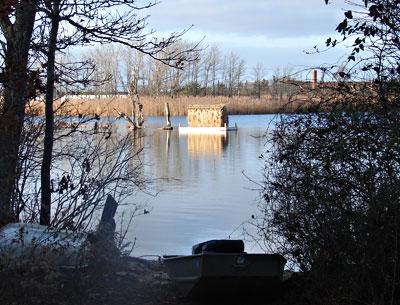Call for Hunting Ban on Fort Pond

A duck blind constructed on a small island at the northwest corner of Fort Pond in Montauk had pondside residents crying “waterfowl” last week. It was the first time in memory that a blind has been placed on Turtle Island, far too close to homes, many residents say, and to the ducks that they had come to view as part of the neighborhood.
The hunters who built the blind decided this week to move it to another part of the pond, but the move has not halted efforts to ban duck hunting in the water body, which measures three miles in circumference from Industrial Road south to Montauk Highway, and east to west from Edgemere to Second House Roads.
Although ducks have been hunted in the pond before, the East Hampton Town Hunting Guide, a bulletin published by the Natural Resources Department, does not list Fort Pond as a hunting area and has posted no signs announcing the duck hunting season.
The hunters’ decision to move the blind came after Jane Bimson, whose house is less than 100 yards from the blind, circulated a petition that reads in part:
“Hunting on Fort Pond has become a danger to those who live near its shoreline, as well as to those who use it recreationally. Additionally, the discharge of firearms close to the [Long Island Power Authority] substation creates the potential for an ecological disaster.” Ms. Bimson, who is an advertising sales representative for The Star, said yesterday she would continue to lobby for a hunting ban in Fort Pond.
It is not the first time she has run afoul of duck hunters in the pond. In presenting her petition to the town board on Nov. 20, Ms. Bimson told members that her boyfriend, Steven LiPani, was fishing near the island the day after Thanksgiving last year when hunters next to the LIPA station purposely fired in his direction. Shot fell about 20 feet short of his boat.
The hunters in question received a warning from the State Department of Environmental Conservation police.
While the duck blind’s builders, Zachary Becker among them, reportedly intend to move their blind, they were not required by law to do so. The D.E.C.’s hunting regulations permit the erection of blinds used in the hunting of waterfowl over water close to shore even in residential areas as long as hunters fire out over the water.
“There is no minimum distance,” said Liza Bobseine, a state conservation officer familiar with the Fort Pond blind issue. “They have to shoot in a safe direction no matter how near or far they are. They can be literally 10 feet from a house and it’s still legal.”
Ms. Bimson and the 120 people who signed her petition, half of whom live on the pond, are asking the town board to ban the hunting of waterfowl in Fort Pond. A number of petition signers said they were upset because they feed the ducks and think of them as pets. Orla Troy, who lives on Edgemere Road, said she was given nine ducks last spring. She raised them and set them free on the pond last year. Five were shot shortly after hunting season started, then three more were lost.
Lidia Karras, who lives pondside on Edgemere Road, said she was afraid to let her three young children outside to play during duck hunting season.
And then there is the noise.
The loud gunshots early in the morning before dawn jar you out of bed, Ms. Bimson told the board. “What about the noise ordinance. Landscapers are not allowed to mow lawns before 7 a.m. Restaurants can’t play music too loud. Why are hunters exempt?” Ms. Bimson asked the board.
The town’s Department of Land Acquisition and Management oversees hunting within the township. Andrew Gaites, who runs the department, said he recommends adding or subtracting hunting areas, although the final decision is the town board’s. His department is also responsible for posting hunting areas. “The board could declare Fort Pond a no discharge zone,” he said, “discharge” referring to the firing of bird shot.
There is a precedent.
The East Hampton Town Trustees, who manage the placement of duck blinds on bottomland elsewhere in the town, have banned hunting in Hook Pond in East Hampton in order to keep it as a preserve.
The trustees own the bottomland, on behalf of the East Hampton public, in Hook Pond and in most other water bodies outside of Montauk, where the 300-year-old trustee panel lost its authority in the 1800s. The town board has not yet made a decision regarding the call to ban hunting in Fort Pond.
